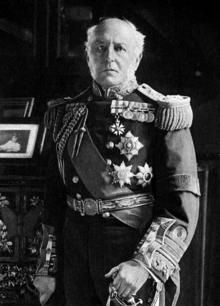Edmund Fremantle
Sir Edmund Fremantle | |
|---|---|
 | |
| Born | 16 June 1836 |
| Died | 10 February 1929 (aged 92) |
| Allegiance | |
| Service/ | |
| Years of service | 1849–1901 |
| Rank | Admiral |
| Commands held | HMS Eclipse HMS Barracouta HMS Lord Warden HMS Invincible HMS Dreadnought East Indies Station China Station Plymouth Command |
| Battles/wars | Second Anglo-Burmese War New Zealand Wars |
| Awards | Knight Grand Cross of the Order of the Bath Knight Grand Cross of the Royal Victorian Order Companion of the Order of St Michael and St George |
Admiral The Honourable Sir Edmund Robert Fremantle GCB GCVO CMG (16 June 1836 – 10 February 1929) was a Royal Navy officer who served as Commander-in-Chief, Plymouth.
[]
Born a son of Thomas Fremantle, 1st Baron Cottesloe and Louisa Elizabeth Nugent, daughter of Sir George Nugent, 1st Baronet and a descendant, through Louisa's mother Maria Skinner, of the Schuyler family and Van Cortlandt family of British North America.[1]
Fremantle joined the Royal Navy in 1849.[2] He served in the Second Anglo-Burmese War in 1852 and the New Zealand Wars in 1864.[2] Then in 1861 he became Commander in HMS Eclipse.[3]
Promoted to captain in 1867, he commanded HMS Barracouta, , HMS Lord Warden and HMS Invincible.[3] He was made Senior Naval Officer in Gibraltar in 1881 and then went on to command HMS Dreadnought.[3] He was promoted Rear-Admiral in 1885 and was made Second-in-Command of the Channel Squadron in 1886 and Commander-in-Chief, East Indies Station in 1888.[3] Promoted to Vice-Admiral from 1890 he went on to be Commander-in-Chief, China Station in 1892 and Commander-in-Chief, Plymouth in 1896.[3] He was promoted to Admiral later that year and retired in June 1901.[4]
Fremantle was granted the honorary office of Rear-Admiral of the United Kingdom in July 1901,[5] and kept this until 1926.
He was appointed Knight Grand Cross of the Order of the Bath in the 1899 Birthday Honours.[6] He was described as "the Father of the British Navy" in Time Magazine.[7]
He later joined the British Fascists.[8]
Family[]
On 31 August 1866, in Sydney, Edmund married Barberina Rogers Isaacs, eldest daughter of the Hon. Robert Mackintosh Isaacs, Solicitor General of New South Wales. The oldest of their five sons, Admiral Sir Sydney Robert Fremantle, was born at sea on 16 November 1867.[3]
See also[]
References[]
- ^ Burke, Bernard. A Genealogical and Heraldic History of the Landed Gentry of Great Britain & Ireland, Volume 2. London: Harrison 1871, page 1270
- ^ Jump up to: a b National Maritime Museum
- ^ Jump up to: a b c d e f William Loney RN
- ^ "No. 27325". The London Gazette. 21 June 1901. p. 4183.
- ^ "No. 27338". The London Gazette. 26 July 1901. p. 4950.
- ^ "No. 27086". The London Gazette (Supplement). 3 June 1899. p. 3585.
- ^ Milestones: Feb. 25, 1929 Time Magazine, 25 February 1929
- ^ Linehan, Thomas (2001). British Fascism, 1918-39: Parties, Ideology and Culture. Manchester University Press. p. 156. ISBN 978-0719050244.
External links[]
- The Dreadnought Project: Edmund Fremantle
- 1836 births
- 1929 deaths
- Royal Navy admirals
- Knights Grand Cross of the Order of the Bath
- Companions of the Order of St Michael and St George
- Younger sons of barons
- English people of Dutch descent
- Schuyler family
- Van Cortlandt family
- British fascists
- English people of American descent
- Knights Grand Cross of the Royal Victorian Order